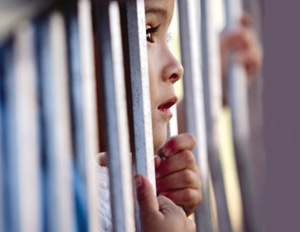By Mariama Bah
The American juvenile justice system is oriented both towards punishing and helping young kids who are going through adolescence while exhibiting criminal behaviors. In most states and on the federal level, the age at which a child is legally considered an adult is eighteen years old. In New York State a juvenile is any person under the age of sixteen. The juvenile courts have authority over three categories of children: juveniles accused of criminal conduct, juveniles abused by their parents or in need of special assistance by the state, and juveniles accused of major state felonies.
In August 18, 2014 a twelve year old boy in Michigan was accused of killing his nine year old companion. The decision to try this case in adult court raised two fundamental questions, first, is this a reasonable course of action when the defendant is only a child? And second, what will the larger community gain by doing so?
A seventeen year old named Marquese had been in and out of the California juvenile system many times, and had seven juvenile felony convictions—all theft related. Since he was only few months away from turning eighteen, Marquese was charged as an adult. Meanwhile, a sixteen year old Californian named Shawn had repeatedly stabbed his father while he was asleep on Christmas night. Shawn’s excuse for stabbing his father was that he was sleepwalking. . .Shawn wasn’t charged as an adult, but instead he was sent to juvenile court.
When the seventeen year old was charged as an adult for all theft related convictions while Shawn was only charged as a juvenile for stabbing his father, people in the community became very upset with the California juvenile court decisions. When Shawn was in juvenile detention he was given a lot more free time then the rest of the kids there. Shawn was allowed to go home for dinner and attend school while the rest of the juvenile kids were not allowed to go anywhere. When people in the community saw the amount of time Shawn was given, they started to think it was because of his skin color and because his family were very wealthy. A lot of people believed that Shawn was the one who should have been sent to jail because what he did clearly endangers the public safety, and the amount of free time he was given definitely wasn’t fair compared to what the other juvenile kids were given. A lot of people in the community believed that Marquese was the one who was supposed to be sent to juvenile, because he just needed a little help away from his family. Since in his case his mother was the one who taught him how to steal at a very young age, they should have just removed him from his mother’s care and taken him to a better home.
In my opinion I feel that no matter what decision the court makes about the twelve-year-old who killed his nine-year-old companion, there will always be people who are not satisfied with the decision. The family of the nine-year-old will definitely not want to hear: “We cannot imprison the boy who killed your son because the child is only twelve years old and there is nothing we can do.” Similarly, the family of the twelve-year-old will not want to hear: “We have to take your twelve-year-old to jail because what he has done endangers public safety.”
I dislike hearing that children are being charged as adults because I think that most of the time it is not their fault. Imagine a twelve-year-old who has not even fully developed yet, being sent to jail for the rest of his life. Just the thought of this is very sad. I feel that most of the time a child’s bad behavior can be caused by the parents because they have been poor role models. Whatever a young child sees his parents do is probably the what the child is going to end up doing. A good example of this is what happened to Marquese, a boy who was featured on the Frontline PBS TV show.
Marquese’s mother had a serious substance abuse problem, and all of his younger siblings were temporarily removed from his mother’s care by the state. Marquese’s home was described as a “crack house” by a court officer, and his mother confessed that she is responsible for all of Marquese’s bad behavior, because she was the one who taught him how to steal. By looking back at Marquese’s family history we learn a lot about his childhood and the kind of environment in which he grew up. Most importantly we learned that his mother was responsible for all seven of his theft-related juvenile felony convictions, because she was the one who taught him how to steal at a very young age.
I think before any youth authority charges any kid as an adult, they should take a long look at the child’s background and their family situation. I think this will definitely help a lot. One solution that I think will help kids like Marquese is to be removed from their parent’s care, because a child’s parents sometimes seem to be the problem. As for kids who chose to engage in bad behavior all on their own, that doesn’t mean they should be automatically charged as adults. Instead the state should invest in counseling and intervention programs that allow young people to make amends for things they may have done.
